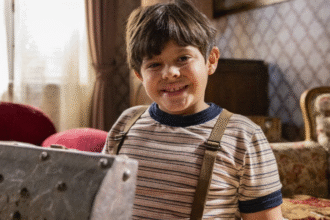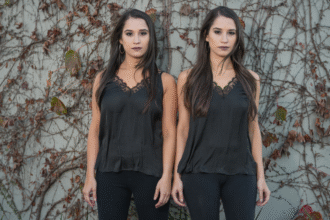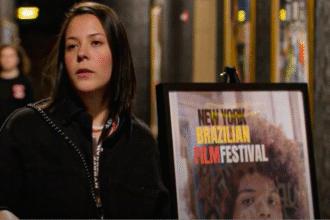The comedy “A Reclamação da República”, written and starring Graziella Moretto, returns to the stage in a very short season at Teatro MorumbiShopping, from July 5th to August 3rd. The show brings up reflections on domestic chores and the absence of women in places of power, while rescuing female figures erased from history books, such as Empress Leopoldina and Marquise de Santos. Winner of the PRIO Humor Award, in the Best Text category, the show promises a decolonial view of Brazilian history and a critical analysis of social organization under the patriarchal system.
The protagonist actress of the play, prevented from getting to work, revisits a school project about the Independence of Brazil, seeking to understand the invisibility of women in the recent history of the country. By investigating the trajectories of historical characters, she tries to assemble the jigsaw puzzle of the past in order to obtain a better view of the current panorama of the Brazilian Republic. With humor and insight, the comedy raises questions about the presence of women in historical events and the urgency of rebuilding the bibliography with female narratives.
Graziella Moretto shares the process of building the show, highlighting the desire to present a decolonial vision of Brazilian history to her daughters. By questioning the absence of women in textbooks, she highlights the importance of diverse female voices in the reconstruction of history and in the struggle for a more just and egalitarian Republic. With her characteristic humour, Graziella seeks to make the public aware of the relevance of female participation in the history of Brazil and the need to recognize their contributions and role in the country’s historical processes.
How did the inspiration to create and star in the show “A Reclamação da República” come about?
It comes from a historic moment, which is obviously quite stimulating for anyone thinking about issues of democracy in Brazil, which was the year 2022 and the eve of the elections, with Brazil celebrating 200 years of independence, and having, once again, people linked to the army, military in power, as it had been in 1972, on the sixth five-hundredth anniversary. Only, this time, trying again to recompose, in a very different Brazil, in 1972, very old narratives about the idea of what independence in Brazil was, what it had been.
And that moment was also, for me personally, who have been studying women’s history for a long time and the invisibility of women in history, a propitious moment, because we were already dealing with so many forms of oppression and realizing that history was going to be told, once again, with so many gaps, with so many failures in this representation of the agents of independence, centering on a single person, on an individual, when it was a movement with so many different forces acting, I thought it was a propitious moment for the construction of this spectacle .
What was the process of researching and constructing the play’s text, considering the colonial view of Brazilian history and the absence of women in textbooks?
Precisely the absence of women that came to me through a textbook was an important starting point, but I had already been interested for a long time in understanding what history is based on these invisibilities, not only of women, but of all the other people who are involved in the historical processes and who do not enter the books. So, I had the help of a colleague who is a very good friend of mine, the historian Patrícia Santos Hansen, who guided me in my research. One of the books that helped me a lot, that helped me to think about these issues of representation of the Republic, which is a well-known history book by Professor José Murilo de Carvalho, who is an author closely associated with this research in Brazil, who is a book about.
He is a scholar, of course, of the Republic, but he has a very interesting work on how the Republic is represented and how it reflects the interests of those in power. And I think that, from then on, I thought we had a Republic to complain about in the sense of claiming back.
What is it like to play a character who reflects on gender inequality, the burden of household chores and the absence of women in places of power?
This character, she is a combo of all my experiences with the experiences of the women around me and my entire life at 51 years old. That is, I’m not just talking about myself today with the load I have in domestic life, but also rethinking the place of my mothers, our mothers, our grandmothers and the women around me. Around me, I have women from many fronts. I have women who are in poverty, who raised children alone in very extreme conditions. There are women who raise children alone in better conditions and are no less burdened, although their financial condition determines much of what it will be like, the way you carry out your motherhood, sometimes with more time to dedicate to one child or less , sometimes with more energy and disposition.
There is something about motherhood that is very lonely and that has to do with the fact that the State and our society abandon the mother, because domestic work is a job, historically, ancestrally, associated with the financial, economic devaluation of women. You domesticate a woman in a job that is worthless, that is, you teach her that that is her function in society, to maintain that house, to maintain… And that is the exchange she makes to exist, to have a house , a protection, to have a husband who provides and everything. But when, in fact, most of these women are doing all the work themselves.
What were the main female figures rescued in the play, such as the Empress Leopoldina and the Marquesa de Santos, and how do they contribute to understanding the current situation of our Republic?
Well, choosing Empress Leopoldina Marquesa de Santos was, logically, a natural choice, because I was thinking about the question of the representation of independence centered on this unique figure of a hero man, who was Dom Pedro I, being the person who declared independence from Brazil. When, in fact, we have countless movements in Brazil, mainly in Bahia, which is already a very recognized thing today, and which also had many women associated, in addition to Maria Quitera and Joana Angélica, who were characters that even managed to go through history a little, but there are many other women associated with this movement, there always have been. And the issue of Leopoldina with the Marquesa I think is emblematic because they are people who had an agency, they were associated with this movement intellectually, politically,
But when, in fact, they had agency and were also thinking about those issues, reflecting, and they left a legacy that was erased. If you look at Empress Leopoldina’s letters, for example, you realize that she was a person interested in politics, interested and a person who had the conditions and skills to make a political movement such as independence.
The show addresses the theme of female representation in the history of Brazil. In your opinion, why is it important to rebuild this bibliography from scratch with many female voices?
So, together with this thing of understanding the current situation of our Republic, we are talking about representativeness, once again. Why do you choose excerpts from history in which men, who are often imperfect men, enter history as hero men, with many qualities and virtues and very few defects? In fact, the defects pass like this because it is not possible. There are so many sources and historical reports that reveal these defects, that it is not possible for you to simply stifle them, put a cloth over them and pretend that they did not happen.
We need to retell our history, not only with the voices of women, but with all the voices that made history happen. With the voice of the indigenous peoples, of the original peoples, with the voice of the descendants of Africans, with the voice of the people who were responsible for the day-to-day of that, in short, revolution that was not really a revolution, because our independence was declared without a popular revolution. So that alone says a lot about the whole process. How do we reach a people who are so controlled that the very idea of revolution is made by the people who were in power?
How has the audience received the show and the message it conveys?
The first was the premiere in September 2022. I premiered on September 2, which is the day that Empress Leopoldina officially signed the independence of Brazil, and I ended on October 1, which was the eve of the first round of elections . So, there was a very urgent feeling of rescue with this idea that we have a republic that is much more than just an ideal. It is the collective’s effort to make a place that has justice, equality, freedom, fraternity, but we were also very threatened by an idea that democracy is a very fragile thing and is a work in progress. It is always under construction, so at that moment there was a sense of urgency about what our role as citizens would be in building a democracy.
But it also crosses much more this issue that we have a gender disparity, which is social, and an abandonment of women in the sense that you demand many things from women, many competences, many tasks that are delivered perfectly, but gives very little in return. Our society gives very little back to these women because this work has been done for free for centuries and centuries.
What is the importance of humor in approaching these sensitive themes, such as the erasure of women in history and the difficulty of reconciling domestic life and work?
So, I would say that, for me, as an actress, humor is never dissociated from drama, nor from tragedy. I think life is all together and mixed. So, personally, I don’t see how one thing is separated from the other, right? Our life has sad and happy moments and we are managing existence, our crises and our joys, our achievements and our defeats, every day trying to make our little boat stay on top of the water and not sink. But, for me, humor is an important tool to introduce complex, hard, difficult topics and often overcome a natural resistance that people have or because they already have many preconceived ideas about these subjects. So, especially on the issue of gender disparity,
I think you can’t go head-on, confront people who are already closed and very defensive. I think humor helps people to disarm themselves a little and then you introduce the question with generosity, which is for the other to be able to put themselves in your place and say, wow, I never saw it from that angle, I never thought about it, never I saw myself in this place, it must not be easy. And then you can open the debate.
How do you see the role of theater and art in promoting debates and reflections on social and political issues?
I think it’s answered a little above, isn’t it? Theater is still a very ancient way of bringing people together in the same place. We make a deal, right? It is? We’re going to spend an hour, two hours here in this dark box. Everybody alive, isn’t it? Which is a very concrete experience of the human and the real.
Something that happens in front of you, as opposed to the cinema, for example, which is a magic box of illusion, where you don’t know if you’re dreaming or if you’re seeing a reality produced before your eyes. The theater is being built in front of you, at the same time that you are building it, because the audience also makes the theater, right? Theater is not only made by the actors, it is made by the audience, it is a joint action. So, I think it’s very close to the idea of what we have now, which is an ancestral political idea, from Greece. The theater is this place of reflection, of construction of thought, and it has to be given back to the people. It is not a privilege unique to artists or the people who make it. It is a joint work of the people on stage and the people in the audience.
In addition to acting, you also sign the authorship of the text of the play. How was this creation process and what is it like to see yourself on stage representing your own words?
Well, in recent years I have been working almost exclusively with my texts, my own texts, so my authorial work is also, for me, my way of existing and resisting. I think that, as an author, I often have a clash with the actress, because, as I said, theater is a living thing and I have a lot of freedom, because, as I am an author too, sometimes I am on stage and I allow myself to drink from this relationship with the audience, I allow myself to be porous to the contributions that people have with their reaction to my work, and this changes the text. But a lot of times the author gets a little upset with the actress because the actress forgets parts of the play that the author wrote so hard and the author says, wow, that was so well written and you’re saying it differently, why not say it the way it is written? So I’m always, in a way, contributing and fighting with myself.
After the show’s success, what message do you hope the public will take with them and how can this contribute to a more just and egalitarian Republic?
for a person who is suffering or who is living in a much worse condition than ours, this is living in society. And that when we laugh at the same things and we feel compassion in our heart for the same things, we are already united in what is most important, which is the human experience, which is to be here inhabiting this planet at this time in the space. So, if we have this understanding that our lives are very similar, that we suffer for the same things and laugh about the same things, we manage to overcome our differences. which is to be here inhabiting this planet in this time in space. So, if we have this understanding that our lives are very similar, that we suffer for the same things and laugh about the same things, we manage to overcome our differences. which is to be here inhabiting this planet in this time in space. So, if we have this understanding that our lives are very similar, that we suffer for the same things and laugh about the same things, we manage to overcome our differences.
Follow Graziella Moretto on Instagram





